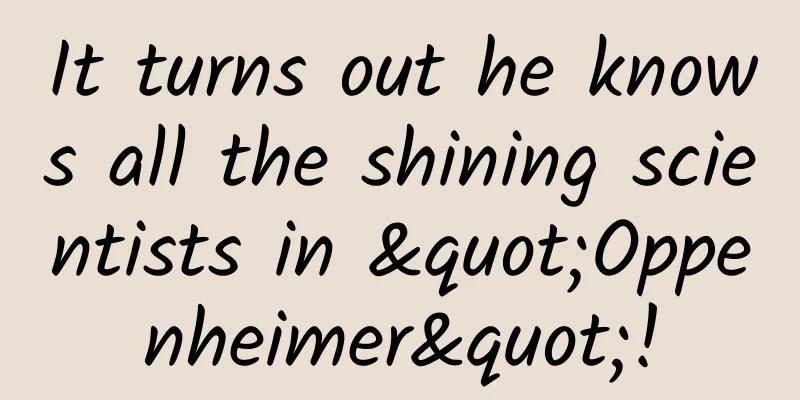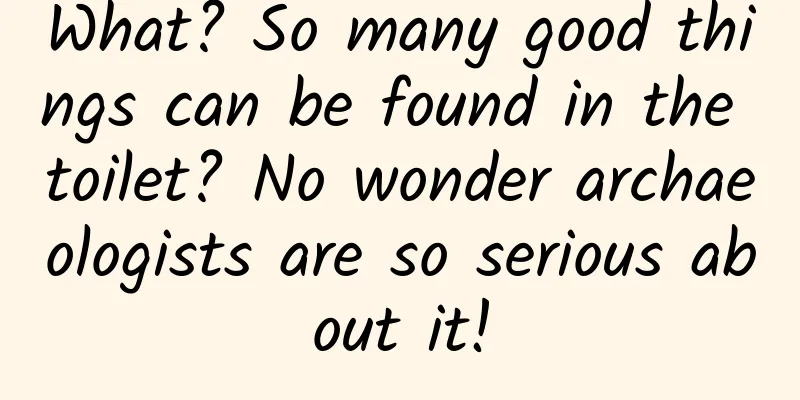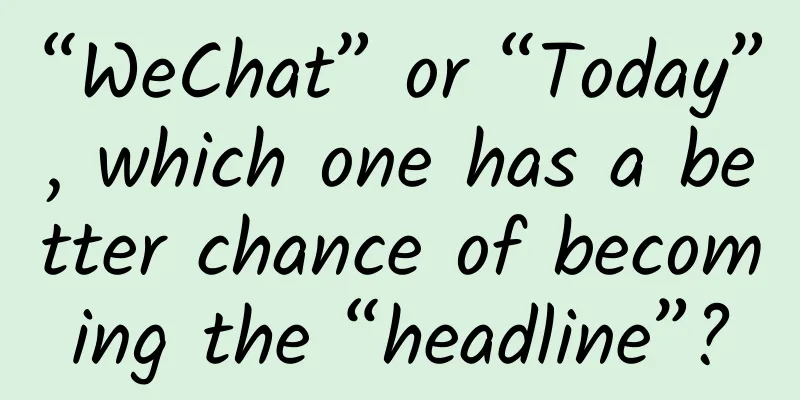It turns out he knows all the shining scientists in "Oppenheimer"!

|
Recently, the movie "Oppenheimer" was released, showing the legendary life of Oppenheimer, the "father of the atomic bomb". Interestingly, "Oppenheimer and Yang Zhenning" once became a hot search on the Internet. Some viewers found that Yang Zhenning had friendships with many scientists in the movie. The friendship between Oppenheimer and Yang Zhenning When Yang Zhenning went to the United States to study, he originally planned to become a student of Enrico Fermi, the "Father of Atomic Energy". In 1945, after Yang Zhenning went to Columbia University to look for Fermi to no avail, he decided to go to Princeton University in New Jersey to look for Eugene Wigner, who studied symmetry problems and proposed the isospin conservation law. Unfortunately, Wigner was about to start his academic leave and could not teach or teach students during the school year. He could only recommend John Wheeler, a student of Niels Bohr and famous for his research on the liquid drop model of nuclear fission, to Yang Zhenning. Just when he was hesitating whether to follow Wheeler to study for a doctorate, Zhang Wenyu, a teacher at Southwest United University, happened to be a visiting professor at Princeton University. Yang Zhenning learned from him that Fermi was about to teach at the University of Chicago, so he finally decided to study for a doctorate at the University of Chicago. In January 1946, Yang Zhenning finally met Fermi at the University of Chicago. However, Fermi was still working at Argonne National Laboratory at that time, and Yang Zhenning could not enter because of his status as an international student. Fermi then introduced him to Samuel Allison, who was studying experimental physics, and Edward Teller, who was studying theoretical physics. Like Oppenheimer, who was not good at experiments in the film, Yang Zhenning also had some bumps and bumps in Allison's laboratory. As the experiment did not go smoothly, Yang Zhenning followed Taylor's advice and switched to theoretical physics. In June 1948, under the guidance of his mentor Taylor, Yang Zhenning passed the defense of a symmetry research paper of only ten pages and obtained his doctorate degree. In the fall of 1948, Yang Zhenning stayed at the University of Chicago as a lecturer in the Department of Physics. In the summer of 1949, Oppenheimer came to the University of Chicago to give a speech. At this time, Oppenheimer had already served as the director of the Institute for Advanced Study in Princeton, continuing to display his talent in managing outstanding scientists. After listening to Oppenheimer's report on the renormalization problem of quantum electrodynamics, Yang Zhenning decided to apply for a job at the Institute for Advanced Study in Princeton and asked Fermi and Taylor to write letters of recommendation. Soon, Oppenheimer sent back the invitation letter, and Yang Zhenning also started his 17-year academic career in Princeton. During this period, he and Tsung-Dao Lee jointly won the Nobel Prize for their research on the law of parity non-conservation. From a brief stay in New York to Princeton, to pursuing a doctorate in Chicago, and then returning to Princeton to work, these three cities witnessed Yang Zhenning's academic growth. Helping Taylor and Oppenheimer repair their relationship When talking about the big names in the field of nuclear physics in the United States, we cannot avoid the "father of the hydrogen bomb" Taylor - he is also Yang Zhenning's mentor. Taylor once conducted postdoctoral research under the famous German physicist Heisenberg, and made remarkable achievements in chemical physics, especially in the research of quasicrystals, which had a direct influence on Yang Zhenning. "When the entire world situation changes, it also affects everyone's development direction." In an interview with science and technology historian Hou Yude, Yang Zhenning once commented on Oppenheimer and Taylor. How did Teller start the research on hydrogen bombs? According to Yang Zhenning, Teller initially worked in the theoretical physics department headed by Hans Bethe, but because of Teller's divergent thinking, he often proposed some new ideas at work meetings to attract the attention of other young scientists, which slowed down the progress. Bethe was troubled by this matter and asked Oppenheimer to discuss it. After thinking about it, Oppenheimer proposed to Teller the idea of appointing him to set up a hydrogen bomb research team alone, and Teller readily accepted it. It was such a decision that laid the foundation for the later proposal of the Teller-Ulam configuration and the successful development of the hydrogen bomb. However, after the Soviet Union successfully tested the atomic bomb in 1949, the General Advisory Committee of the Atomic Energy Commission, chaired by Oppenheimer and including Fermi, Isidor Rabi and others, submitted a report to the president opposing the development of the hydrogen bomb. This move undoubtedly made Taylor and Ernest Lawrence, who actively promoted the development of the hydrogen bomb, dissatisfied with Oppenheimer, and Taylor also attributed the rejections encountered when recruiting scientists to Oppenheimer's intervention, which also became the node of the relationship between Oppenheimer and Taylor. We can see in the film that at the hearing in 1954, Fermi made a defense in support of Oppenheimer, while Taylor gave an answer that was unfavorable to Oppenheimer, which also led to Taylor being isolated by the physics community thereafter. Yang Zhenning once tried to persuade his mentor Taylor to do something to repair the relationship with Oppenheimer. According to Yang Zhenning's recollection, he once suggested Taylor to nominate Oppenheimer for the Fermi Prize. In 1963, when Oppenheimer won the Fermi Prize, Taylor wrote a letter to congratulate him and shook hands with him at the award ceremony in December of that year. In 1965, Oppenheimer said he was about to retire, his wife was ill, and he had interpersonal problems. Before leaving, he recommended Yang Zhenning to succeed him as the director of the Institute for Advanced Study. After careful consideration, Yang Zhenning declined the invitation and chose to serve as the director of the Institute for Theoretical Physics at the newly established State University of New York at Stony Brook in 1966. The following year, Oppenheimer died of throat cancer. I am fortunate to be a witness to a piece of history. Fermi, Lawrence, Rabi... There are many Nobel Prize winners in the movie "Oppenheimer". Therefore, whenever people talk about Oppenheimer's achievements, they always wonder "why he didn't win the Nobel Prize". Yang Zhenning believes that Oppenheimer's greatest academic contribution in his life was the study of black holes, and the astronomical community did not confirm the existence of black holes until 5 years after his death. This may be one of the reasons why Oppenheimer did not win the Nobel Prize. Perhaps, we don’t need to dwell too much on the Nobel Prize. Robert Merton, a sociologist of science, once divided great scientists into five levels: “named for the era”, “father of the discipline”, “named for the law, etc.”, “named for the unit”, and “Nobel Prize winner”. Oppenheimer and his mentor Max Born jointly proposed an approximate method for quantum mechanics equations named “Born-Oppenheimer approximation”. From the perspective of Merton’s theory, this can be regarded as an achievement higher than the Nobel Prize. In addition, as a military project, the Manhattan Project required many scientists. Fermi, Wigner, Wheeler, Allison, Taylor and others were involved. Oppenheimer was not only a scientist, but also a successful scientist manager. He made outstanding contributions to the success of the Manhattan Project. Before and after the Manhattan Project, many scientists changed their jobs. Yang Zhenning was a witness of this period. |
Recommend
21 ways to help you acquire effective users at low cost!
From the perspective of product operation , how t...
Yixin 3.0: Another desperate battle for operators
Since Tencent launched WeChat Phonebook, "fr...
Customer acquisition and conversion methods: applicable to both e-commerce and knowledge payment
Recently many friends have asked me why other peo...
How can Kuaishou promote works for free and make them popular? What are the specific operation methods?
This article mainly introduces how to promote wor...
Yan Xiaoyun built Alibaba's iron army in 10 days
Yan Xiaoyun: Building Alibaba's Iron Army in ...
How to create a WeChat mini program? How much does it cost to create one in the mini program mall?
It has been more than 4 years since the WeChat Mi...
Caixuetang's "Stock Market Trend Trading Method 1+2+3" deciphers the main trading techniques and gives you the supreme strategy system
Caixuetang's "Stock Market Trend Trading...
Compared to reading, is “listening to books” just passively receiving information?
Tuchong Creative How long has it been since you f...
Shocking! The heart is actually a Möbius strip? What’s even more surprising is…
Experts in this article: Lv Mingming, Master'...
Link Motion issued a shareholder letter on related issues
Beijing time, September 18, 2018 – Link Mobility ...
Review: How to effectively build a user incentive system!
A product will go through four stages: seed stage...
From 0 to 20 million, the 3-year growth path of Get APP
1. Get the PMF of the app PMF, or product-market ...
Lanzhou SEO training: Summarize the writing methods and precautions of website SEO optimization titles
In website optimization, title SEO optimization i...
Wake up, there is no food in the world that makes you thinner the more you eat it!
Have you heard of "negative calorie foods&qu...
Baidu SEM bidding price adjustment principles and techniques shared!
After Baidu launched the Fengchao system, althoug...









